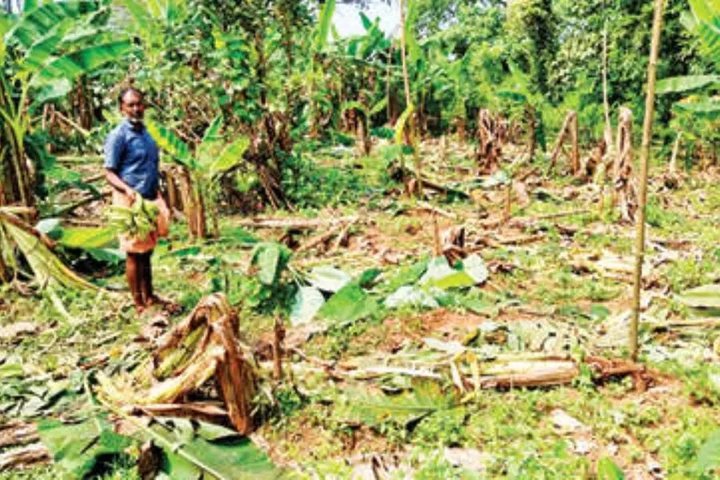In Iritty, herd of wild elephants destroys 600 plantain trees in a single night

Three elephants that crossed the Paalappuzha river from the Aralam Farm completely ravaged the farm
In Iritty, herd of wild elephants destroys 600 plantain trees in a single night
Farmer Babu Joseph at the plantain farm in Palappuzha Koodaladu that was destroyed by a herd of wild elephants
Iritty: A herd of wild elephants trampled and destroyed nearly 600 ready-to-be harvested nenthravazha (plantain) trees in a single night. The life and livelihood of farmer Babu Joseph Chundanthadathil of Muzhakkunnu–Paalappuzha Koodalatte came crashing down on Saturday night when elephants ravaged his farm. Even Forest Department officials who visited the site were shocked —something no farmer who loves his land ever wishes to see.
Three elephants that crossed the Paalappuzha river from the Aralam Farm completely ravaged the farm. Babu Joseph cultivates the land—10 acres taken on lease from a native of Punnad. Eight acres were used for fodder grass cultivation, while two acres near the riverbank were for nenthravazha and vegetables. Of the 1,600 plantain trees, more than half were ready for harvest. On Saturday, a buyer had agreed to visit the farm to collect around 30 fully ripened bunches. Those bunches too were destroyed by the elephants.
Wild elephants generally trample plantain trees and eat only the stem’s juicy core. However, in this case, the elephants had eaten the ripe fruit also, said Iritty Section Forester C Sunil Kumar, who inspected the site. Pipes installed for drip irrigation were also broken. Elephant footprints covered the entire farmland.
To deter elephants that usually cross the Paalappuzha river from Aralam Farm, the locals had pooled money to install a hanging solar fence. This had helped reduce elephant attacks. However, the Forest Department had not paid the caretaker of the fence for more than six months, leading to a stop in maintenance—something locals say allowed elephants to return.
The destroyed plantains belonged to the high-yielding Swarnamukhi variety, which requires year-long care and attention until harvest. Each bunch weighs between 20 and 35 kilograms. Babu Joseph said he had taken loans to fund the cultivation and has now suffered a loss of around ₹3 lakh.



0 Comments